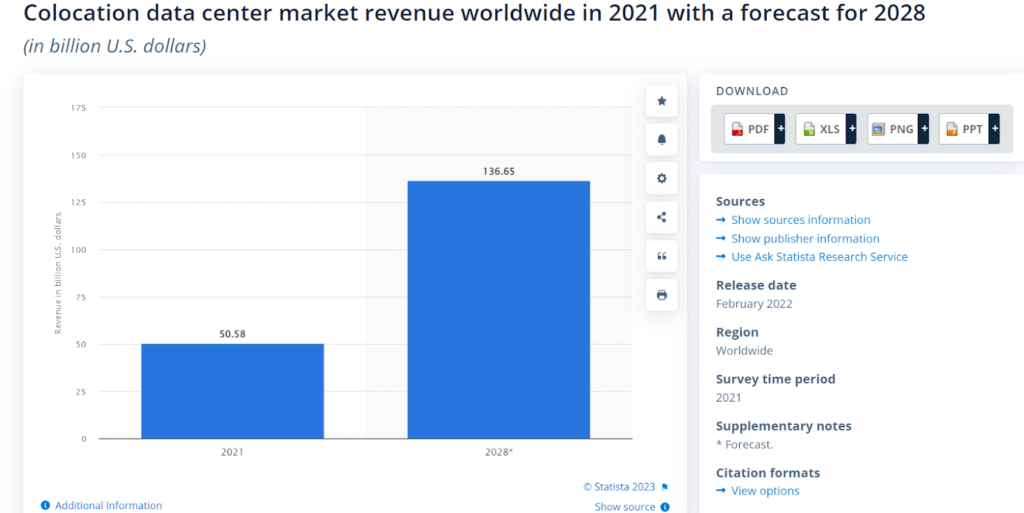Not sure which data storage model fits your business best? We get it—trends come and go and new technologies pop up every week. On top of that, cybersecurity scares alone are enough to get you to reconsider your current model.
Let’s take a look at two of the most popular enterprise data storage options: colocation and private cloud. What do they have in common, what are the main differences between them, and how do you choose?
Colocation at a Glance: Adoption and Definition
In recent years, there’s been a massive migration from cloud storage to colocation. As expected, this prompted an equally massive growth of the colocation market. One analysis expects it to reach $202 billion by 2030, while Statista takes a more conservative approach and estimates a $136 billion industry by 2028:

Why do companies flock to this storage model? Because it offers a lot of benefits in terms of flexibility, real scalability, and cybersecurity.
Essentially, colocation means that you will be housing your IT infrastructure (servers, networking equipment, and more) in a secure data center. You can think of it as an all-inclusive hotel: your equipment is hosted there in prime conditions. You pay for the “room,” aka rack space, but that also includes electricity supply, cooling, facility security and access control, cooling, and maintenance and security services.
Colocation is far more affordable than building and maintaining an on-premise data center. You share the space and the maintenance team with other companies, and that cuts your costs significantly.
Better yet, if you choose a colocation facility that’s close to your headquarters, all your data is just a quick drive away—unlike when you store it in the cloud.
This brings us to our next point: private cloud storage, its strengths, and its weaknesses.
Private Cloud at a Glance: Adoption and Definition
Private cloud adoption is also on the rise:

The main appeal of private cloud is that it comes with better security than its public counterpart. You also have more control over how your data is stored and accessed.
However, private clouds aren’t all that private. You still share the infrastructure with other companies and all it takes is one attack to compromise it entirely—your data included.
In other words, having a strong security policy is not enough if the companies you share the infrastructure with don’t. You can read more about public cloud and its security issues here.
Scalability is another important aspect here: you can scale your cloud storage packages up or down depending on how much server space you use. Still, it’s worth noting that it’s not real scalability: you will often end up upgrading to a new plan that’s not customized to your needs, so you will pay for more than what you use.
On the other hand, you don’t have to invest in your own hardware, as you do with colocation.
Colocation vs Private Cloud: What’s the Ideal Choice for You?
At Heartland Technology, we run a colocation facility. So it would be in our best interest to tell you that colocation is always the way to go, no matter what.
But that would also be dishonest.
The truth is that there is no one-size-fits-all in data storage. You will have to make your own choice depending on your own needs and goals. Here are a few questions to ponder before making that choice:
- Do you need physical access to your data (for instance, in the case of a natural disaster that may affect your data center)? If so, look for a colocation facility in your area.
- Do you already have the hardware in-house, perhaps because you want to shut down your on-premise data center and cut costs? If so, colocation is the best alternative.
- Don’t have any hardware and you don’t want a massive initial investment? Start with private cloud storage—you will usually only have to pay a monthly subscription.
- Do you handle sensitive data or are in a sensitive industry (like the financial sector or health services)? Check out the regulations around your industry—you may need to store your data on-premise or in a certified colocation facility.
Last but not least, remember that you don’t have to go all-in on a single option. You can choose to have part of your data stored in a colocation facility and part of it in a private cloud, depending on your access needs and the regulations in your industry.
You can even go for a hybrid cloud approach and add public cloud to the mix. Colocation supports the hybrid cloud approach, especially for companies that want to diversify their storage options and ensure optimal security where it matters.
Need expert advice to make this choice? Our consultants are just an email away: Schedule your free, no-obligations consulting call here.